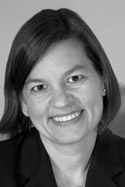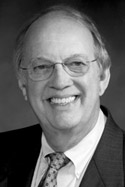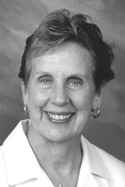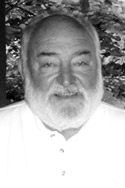The suspense didn’t last long, but that wasn’t due to any lack of candidates in the Democratic primary for the Buncombe County Board of Commissioners. It’s just that the results came in so fast there was hardly any time for the tension to build among the nine contenders and others tracking the returns.
Within two hours of when the polls closed on May 6, the numbers were in from all 77 precincts, and Holly Jones, K. Ray Bailey, Carol Peterson and Bill Stanley had made the cut to square off against four Republicans in the November general election. Although incumbents Peterson and Stanley made the grade, both drew fewer votes than a pair of newcomers to county politics (though Jones is a two-term Asheville City Council member). The remaining incumbents did not appear on the primary ballot: Commissioner David Young made an unsuccessful bid for state treasurer (see “Painting by the Numbers” elsewhere in this issue), and Commissioner David Gantt will challenge Nathan Ramsey for the chairman’s seat in November. Thus, a total of four seats were up for grabs.




And while the vote totals for the second-, third- and fourth-place finishers were all bunched together pretty closely, Jones, the front-runner, wound up with a definitive 21.45 percent. Her 30,535 votes were the most cast locally for any candidate in any race, surpassing even Sen. Barack Obama‘s 27,899 votes.
On the evening of May 6, Jen Bowen, a local artist who’s working on Jones’ campaign, was making the rounds photographing the aftermath of a primary dominated by the much-anticipated Obama/Clinton presidential contest. And though Bowen said she wasn’t surprised by Jones’ rise to the top, she said the margin of victory was unexpected. “We did not realize there was going to be a [10,000-vote] lead,” she told Xpress. “We knew we were going up against some strong opponents.”
For her part, Jones seemed matter-of-fact about her victory as she chatted with supporters at Dirty Jack’s. “We’ve got an important message for this community that people are hungry for,” the candidate said: “One of serving the people and protecting the mountains.”
Like some of her fellow candidates, Jones said she planned to take a few days off before returning to the campaign grind, predicting that the real battle is still to come. “I’m going to work harder in the general [election] than I did in the primary,” she vowed.
The other three victorious candidates hung around the Board of Elections as the numbers rolled in. Reporters, candidates and campaign aides filled the small room as results scrolled across a screen on the wall.
Bailey (14.94 percent, 21,268 votes) said he was happy with the results of his first run for political office. “I’ve never been through this process before,” he noted. “I’m pleased that my first effort garnered a considerable number of votes. But I know this is the first step in a two-step process.”
Peterson and Stanley, on the other hand, had the advantage of having been through this before.
“I am so pleased with the number of people who took part in this election,” said Peterson (13.81 percent, 19,655 votes). “It is good to see what the team will be on the Democratic slate in November.”
Stanley (12.29 percent, 17,499 votes), a five-term commissioner who barely edged out first-time candidate Cecil Bothwell (11.54 percent, 16,425 votes), said his public-service experience was what got him through the primary.
“When you’ve been here long as I have, your record’s out there,” he told Xpress. “If you’re doing it good, then they vote for you like the Democrats did tonight. We’ve done it well for the 20 years I’ve been here.”
Both incumbents downplayed the long-running city/county water dispute, saying they’re ready to work productively with Jones, a current City Council member, to advance the Democratic slate in the run-up to November.
“We work together on so many things, and that’s just one small issue,” said Peterson. “We’re cooperative both ways: City Council with us and us with them on so many, many issues that that’s just a blip.”
Jones, meanwhile, said, “I want to be part of a team that is bridging some old divides.” And that, she said, includes looking beyond the city limits, observing, “We need to be thinking more regionally.”
The day after the election, Bothwell wrote on his blog (bothwellsblog.wordpress.com) that the results had confirmed his views on campaign finance, noting that both Jones and Bailey had significantly outspent him and that he had an uphill fight against the sitting commissioners.
“Unseating incumbents is extremely difficult, and we came pretty close. We proved once again, if proof is needed, that under current campaign-finance laws the race is almost invariably won at the bank, not in debate,” he wrote.
All told, there were 62,730 ballots cast in Buncombe County—38.06 percent of registered voters. Asked about the speed of this year’s tally, Election Services Director Trena Parker told Xpress that this time around, election workers had more experience in handling the paper-ballot system that was put in place in 2006 in the wake of concerns about ballot security with the touch-screen machines the county had purchased some years earlier. As a result, election workers could quickly print results on-site instead of having to physically transport the data-storage cartridges to the Board of Elections, as they’d done in the past to reduce the chance of error.



Before you comment
The comments section is here to provide a platform for civil dialogue on the issues we face together as a local community. Xpress is committed to offering this platform for all voices, but when the tone of the discussion gets nasty or strays off topic, we believe many people choose not to participate. Xpress editors are determined to moderate comments to ensure a constructive interchange is maintained. All comments judged not to be in keeping with the spirit of civil discourse will be removed and repeat violators will be banned. See here for our terms of service. Thank you for being part of this effort to promote respectful discussion.